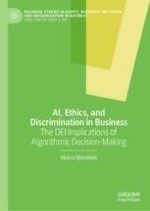This book takes a historical approach to explore data, algorithms, their use in practice through applications of AI in various settings, and all of the surrounding ethical and DEI implications. Summarizing our current knowledge and highlighting gaps, it offers original examples from empirical research in various settings, such as healthcare, social media, and the GIG economy.
The author investigates how systems relying on a binary structure (machines) work in systems that are instead analogic (societies). Further, he examines how underrepresented populations, who have been historically penalized by technologies, can play an active role in the design of automated systems, with a specific focus on the US legal and social system.
One issue is that main tasks of machines concern classification, which, while efficient for speeding up decision-making processes, are inherently biased. Ultimately, this work advocates for ethical design and responsible implementation and deployment of technology in organizations and society through through government-sponsored social justice, in contrast with free market policies.
This interdisciplinary text contributes to the timely and relevant debate on algorithmic fairness, biases, and potential discriminations. It will appeal to researchers in business ethics and information systems while building on theories from anthropology, psychology, sociology, management, marketing, and economics.
